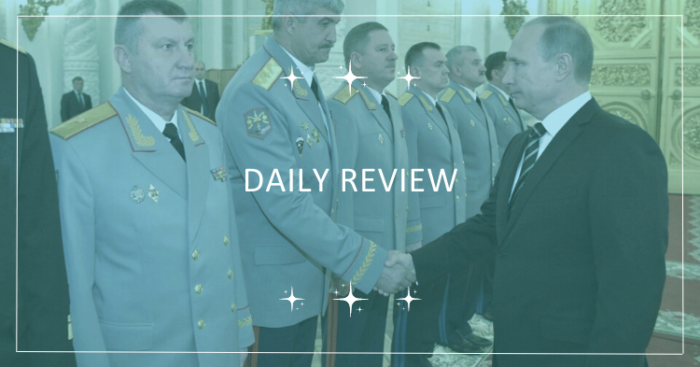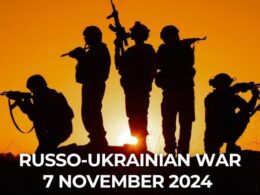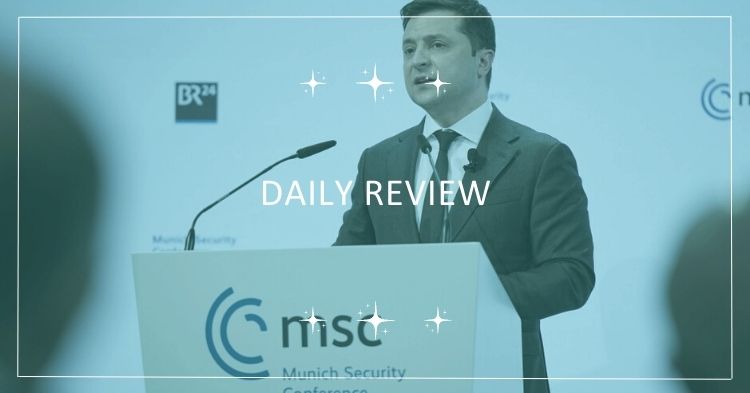December 20 in the war zone
- According to Ukraine’s Joint Forces Operation Staff, Russian proxies launched five attacks on Ukrainian positions in Donetsk, Luhansk, and Mariupol sectors, including heavy artillery and weapons banned by the Minsk accords.
- 3 Ukrainian soldiers were injured in a mine blast, one seriously, JFO says.
- Between the evenings of December 17-19, OSCE’s Special Monitoring Mission recorded 219 violations, including 42 explosions in Donetsk Oblast; 24 violations, including 7 explosions in Luhansk Oblast.
- Russian-led armed formations denied OSCE SMM passage twice at Zolote and Molodizhne, Luhansk Oblast.
News flash
- US Department of the State recommends that its citizens should refrain from traveling to Ukraine; the authorities pointed out that there’s a threat of Russian military invasion.
- NATO Secretary-General Jens Stoltenberg reiterated that any further aggression of the Russian Federation against Ukraine would carry a very high price
- “We see that by its actions Russia is trying to put pressure on Ukraine and is creating a threat between Ukraine’s close ties with the EU and NATO. Nobody has the right to influence the decision and choice of an independent state,” Lithuanian President Gitanas Nausėda said in a press briefing following the Lublin Triangle meeting.
- “Our position as presidents of the Lublin Triangle is very clear: Ukraine’s security is a fundamental issue. We must not only ban military attacks on Ukraine, but we must do everything to prevent such an attack,” Polish President Andrzej Duda said in the press briefing.
- The presidents of Ukraine, Poland, and Lithuania expressed their deep concern over Russia’s Nord Stream 2 gas pipeline project and expressed their readiness to take joint action to counter Russia’s monopolization of the European gas market.
Russia keeps 600-800 military top brass deployed in Donbas – Ukraine’s intelligence
About 600 to 800 Russian military officers and generals have been permanently stationed in the temporarily occupied east of Ukraine, according to the Main Directorate of Intelligence (HUR) of Ukraine’s defense ministry.
No traces of weapons other than Russian BUK found in MH17
At the Schiphol Judicial Complex in the Netherlands, where the MH17 case is being heard, Dutch prosecutors, presenting the indictment, said that the investigation revealed traces of no other weapon than the Buk missile system that could destroy Flight MH17.
Leaders of France and Germany talked with Putin about Ukraine
Yesterday, 20 December, US President Biden’s adviser Jake Sullivan spoke with Yuriy Ushakov, Foreign Policy Advisor to Russian President Putin, regarding the so-called “security guarantees,” in which Moscow demands the exclusion of Ukraine’s membership in NATO. The White House said that Mr. Sullivan made clear that any dialogue must be “based on reciprocity and address our concerns about Russia’s actions, and take place in full coordination with our European Allies and partners.”
So today, French President, Emmanuel Macron and Russian President Vladimir Putin discussed the issue. Another Putin’s call in which he also presented his demands on the “security guaranties” was to German Chancellor Olaf Scholz.
Meanwhile, Ukrainian President Volodymyr Zelenskyy says that Ukraine is ready to meet Russia in any format, and leaders of the Baltic States declared their readiness to provide military assistance to Ukraine.
Preparing a casus belli?
Russian Defense Minister Sergey Shoigu claims that some US military contractors prepare a provocation involving chemical weapons in the Donbas:
https://twitter.com/carlbildt/status/1473253568614440961
Meanwhile, the head of the Donetsk occupation administration, Denis Pushilin, says that US mercenaries are going to poison the water with the chemicals mentioned by Shoigu.
Russian invasion “danger period”
With Russian forces massed on the border raising concerns of a major offensive in the coming weeks or months, Ukraine has entered into what some intelligence observers have described as a Russian invasion “danger period,” Nolan Peterson writes.
“Does the Kremlin Understand Ukraine? Apparently Not”
“It is time for the Russian leadership to reexamine the premises on which it has based its approach. Bad understanding leads to bad policy, and the Kremlin appears poised to make another in a line of mistakes in its approach toward Ukraine. This one would prove a tragedy for Ukraine … but also for Russia,” writes former US ambassador to Ukraine Steven Pifer in his op-ed on Moscow Times.
Persecution of Poroshenko
After yesterday’s news on Ukraine’s acting Prosecutor General Oleksiy Symonenko charging former President Petro Poroshenko with high treason and aiding terrorism, Mr. Poroshenko said today in a video address that he is going to return to Ukraine from a business trip abroad in the first half of January.
Meanwhile, the US Embassy in Kyiv has posted a tweet, saying that
“The United States is closely following the case against former President Poroshenko. Crucial that process and outcome be based on the rule of law, not politics.”
Meanwhile, today Ukraine’s Antimonopoly Committee came up with a decision to fine the Roshen group of companies linked to the ex-president 283 million hryvnias ($10.3 million). Enterprises from the group call the Committee’s fine unfounded and believe it’s connected to the political persecution of Petro Poroshenko.
Anti-Corruption Prosecutor chief selection committee fails to approve clear winner; activists point fingers at President
As predicted by anti-corruption activists, Ukraine did not select a new head of the Special Anti-Corruption Prosecutor’s Office (SAPO) on 21 December. The selection committee convened and announced the results of the contest, yet did not vote to approve the results.
Number of political prisoners in Belarus nears 1000
As of December, the number of political prisoners of Lukashenka’s regime in Belarus has reached 933, Belsat reports. The Belarusian human rights community issued a joint statement, in which they have recognized another six persons as political prisoners. Among those is Ryhor Kastusiou, the chairman of the Belarusian People’s Front party and a cancer patient.
Official Ukraine now on Spotify
Ukraine has launched its official account on Spotify with contemporary Ukrainian music, both in English and Ukrainian languages. The account features Ukrainian bands known internationally, such as DakhaBrakha, ONUKA, and Go_A but also many others who became popular in their home country.
Unique OUN documents dated 1948-1951 discovered in Ternopil Oblast.
Yuriy Syrotyuk, director of the Ukrainian Institute for Strategic Studies, reported that the three milk cans also contained a most valuable find – over 20 previously unknown sketches by Nil Khasevych, a Ukrainian graphic artist, public and political figure, member of the OUN (Organization of Ukrainian Nationalists) and the UHVR (Ukrainian Supreme Liberation Council). Khasevych is often referred to as the “image-maker” of the Ukrainian Insurgent Army (UPA) because he created its visual identity by designing its leaflets, posters, and awards.
USSR’s demise was anything but bloodless
“Perhaps the one that is most widely believed [myths] but is demonstrably false is that the demise of the USSR was a bloodless event. In fact, it was very bloody but not in the center,” argues analyst Paul Goble and gives some examples on the issue.
Theatrical awards
Ukrainians received three major awards from the 28th Cairo International Experimental Theater Festival, according to the Embassy of Ukraine in Egypt.
- Tragicomedy “Caligula” by the Taras Shevchenko Kharkiv State Academic Ukrainian Drama Theater (the play was directed by Oleksandr Kovshun) based on the work of Albert Camus won the Grand Prix of the festival.
- The Best Director Award was presented to Oleksandr Kovshun for the play “Caligula”.
- Maksym Sterlik, who played Caligula, got the prize for the best male role.








